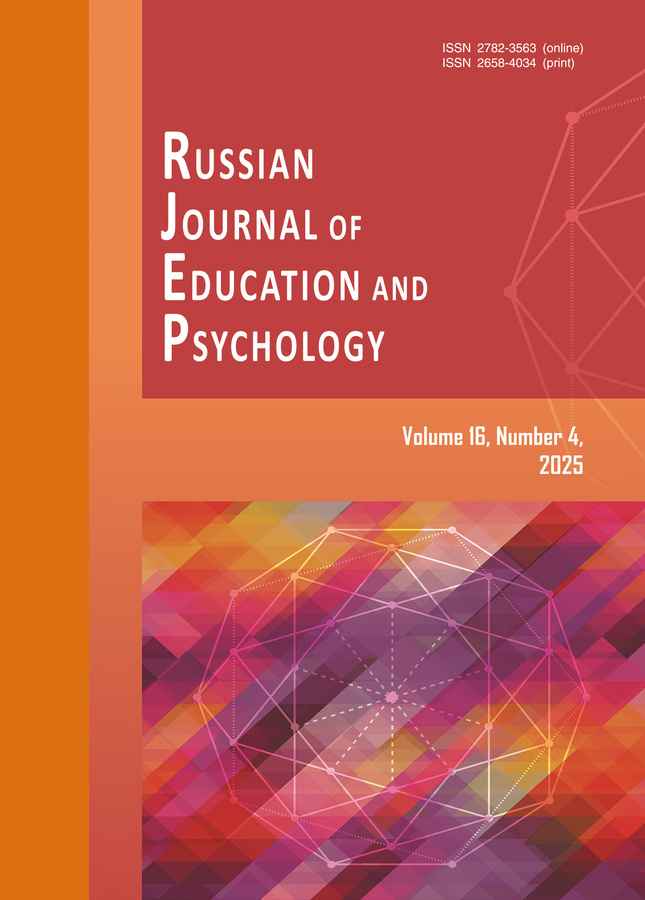About childhood and youth in their metaphysical and pedagogical measurement
- Autores: Gagaev P.A.1
-
Afiliações:
- Penza State University
- Edição: Volume 16, Nº 4 (2025)
- Páginas: 122-141
- Seção: Educational and Pedagogical Studies
- ##submission.datePublished##: 30.09.2025
- URL: https://journal-vniispk.ru/2658-4034/article/view/348984
- DOI: https://doi.org/10.12731/2658-4034-2025-16-4-897
- EDN: https://elibrary.ru/EMRFHN
- ID: 348984
Citar
Texto integral
Resumo
Background. The article deals with the problem of childhood and adolescence in their correlation with the metaphysical nature of man. It is noted that in modern psychological and pedagogical literature, these periods of an individual's life are understood only in the aspect of human socialization, which impoverishes knowledge about the latter in its formation and development.
The purpose of the work is to describe the metaphysical content in the psyche and behavior of growing spirituality and formulate a strategy for pedagogical support of its deployment in the child's psyche.
Materials and methods. The subject of comprehension in the article is research in the field of anthropology, epistemology (both foreign and domestic), age psychology, developmental psychology, pedagogy of childhood and youth (positivist and idealistic orientation).
The methodology of the work is the substratum reflection of A.A. Gagaev, according to which the subject of research retains its single–multiple basis and its characteristic desire for personification. The methods used in the work are phenomenological analysis, which involves the retention of visible features of the reality under study in abstraction, and substrate synthesis (combining all the identified foundations of the object of comprehension on a single or multiple basis).
Results. Childhood in the work is interpreted as a period of man's discovery of the universal principle in himself (the understanding of man goes back to the works of Plato) - special semantic formations and intentions that are not conditioned by the external environment and lead the individual out of his social being (the desire to keep everything and everything in himself, not to be conditioned by anything, the search for bringing consent to everything and everything and Childhood is understood as a period of meeting a person with himself, knowing himself as universal spirituality, realizing the general bliss and drama of his being.
Cognition in childhood is carried out on a contemplative (non-activity) basis. Contemplation is interpreted as an idealistic-intuitionistic form of comprehension of the world.
Childhood in the work correlates with the pedagogy of non-interference - maintaining an organic focus on oneself for young spirituality and cognition of one's own universal on this basis. The most important didactic unit in the pedagogy of non-interference is the classical text - philosophical, artistic, scientific, and other.
Laissez-faire pedagogy requires a philosopher teacher who is able to interact with the student on an idealistic-intuitionistic basis.
Palavras-chave
Sobre autores
Pavel Gagaev
Penza State University
Autor responsável pela correspondência
Email: gagaevp@mail.ru
ORCID ID: 0000-0001-8904-420X
Código SPIN: 2976-7610
D.Ed., Professor, Professor of the Department of Pedagogy and Psychology
Rússia, 40, Krasnaya Str., Penza, 440026, Russian Federation
Bibliografia
- Aristotle. (1976). Works in four volumes (Vol. 1). Moscow: Mysl. 550 p.
- Gagaev, A. A. (1994). Theory and methodology of the substrate approach in scientific cognition. Saransk: Mordovia State University. 47 p. EDN: https://elibrary.ru/ZJYUFL
- Gagaev, A. A., & Gagaev, P. A. (2022). On the contemplative basis of human existence. Context and Reflection: Philosophy on the World and Human, 11(6–1), 29–36. https://doi.org/10.34670/AR.2022.96.77.022. EDN: https://elibrary.ru/LBMIRZ
- Gagaev, A. A., & Gagaev, P. A. (2014). Pedagogy of non-interference. Saint Petersburg: Aleteya. 284 p.
- Zenkovsky, V. V. (2002). Problems of education in the light of Christian anthropology. In: Pedagogical works (pp. 206–339). Saransk: Krasny Oktyabr.
- Lossky, N. O. (1991). Intuitionists. In: History of Russian philosophy (pp. 320–380). Moscow: Vysshaya Shkola.
- Lygina, M. A., Gavrilova, M. A., & Gagaev, P. A. (2022). Classical text in pedagogy classes at university. Pedagogical Education, 3(2), 54–60. EDN: https://elibrary.ru/KEJBKG
- Mahabharata. Ramayana. (1974). Moscow: Khudozhestvennaya Literatura. 606 p.
- Nietzsche, F. (2012). Untimely reflections (Vol. 8). Moscow. 319 p.
- Pirogov, N. I. (1985). Selected works. Moscow: Pedagogika. 496 p.
- Plato. (2011). Dialogues. Moscow: Astrel. 349 p.
- Teilhard de Chardin, P. (2001). The phenomenon of man. Moscow: Ustoychivyy Mir. 232 p.
- Theophan the Recluse. (1994). Outline of Christian morality (Vol. 1). Published by the Holy Dormition Pskovo-Pechersky Monastery and Palomnik Publishing House. 330 p.
- Frank, S. L. (1990). The Unknowable (Ontological introduction to the philosophy of religion). Moscow: Pravda. 608 p.
- Buler-Niederberger, D. (2010). Introduction: Childhood sociology – defining the state of art and ensuring reflection. Current Sociology, 58(2), 155–164. https://doi.org/10.1177/0011392109354239
- James, A., & Prout, A. (Eds.). (1997). Constructing and Reconstructing Childhood. New York: Psychology Press, 269 p.
- Elkind, D. (1995). School and Family in the Postmodern World. The Phi Delta Kappa International, 77(1), 8–14. Retrieved from http://www.jstor.org/stable/20405475 (accessed: 06.06.2016). EDN: https://elibrary.ru/CBDKUD
- Lanca, R., & Berman, B. (2009). Biocentrism. How Life and Consciousness are the Keys to Understanding the True Nature of the Universe. Bendella BOKS, LNC. Dallas, TX, 215 p.
Arquivos suplementares










